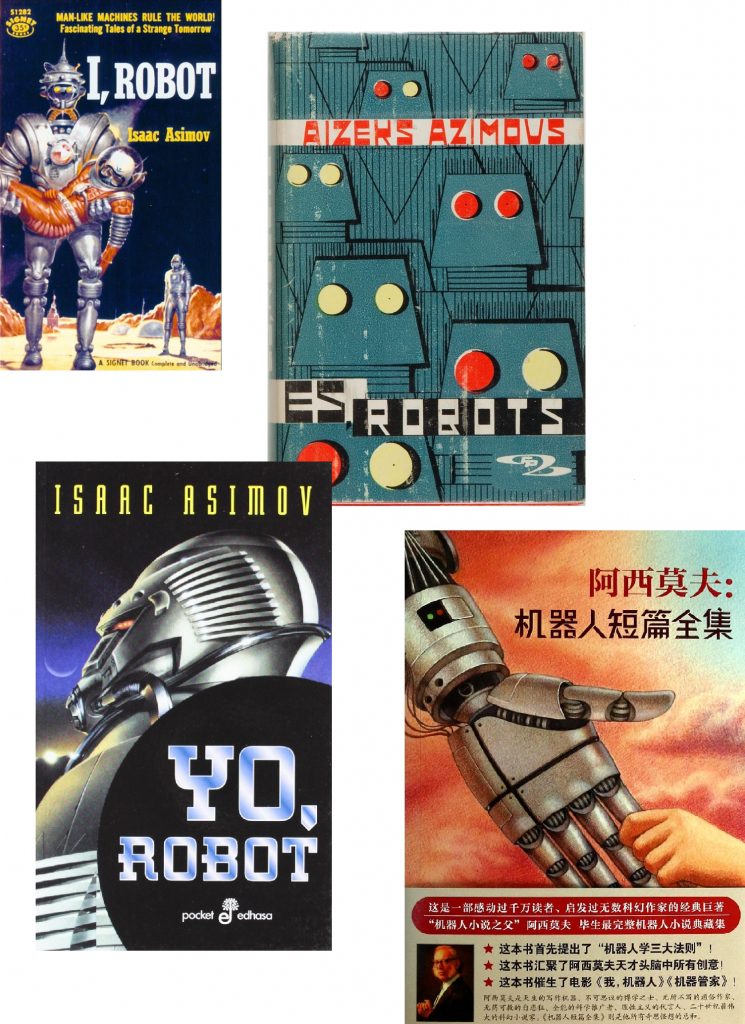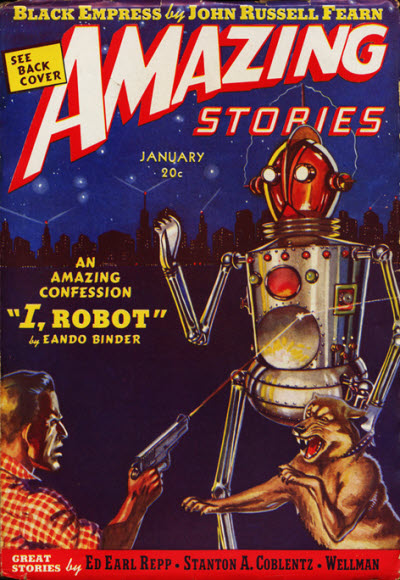Everyone knows the famous and renowned author Isaac Asimov (Petrovichi, 1920 – New York, 1992). In our time he is considered one of the best science-fiction writers of all times. For many in Europe he is the science-fiction writer, often the only one ordinary people know. Biochemist, lecturer, annotator, not to mention the great relevance and popularity he had as scientific populariser, he was very prolific: without the slightest loss of quality the total of his works amounts exactly to 849 original productions, comprising in the count novels, non-fiction books, edited-books, single articles and short stories. The career of the “good doctor” begun as a pulp-fiction author with the short story “Marooned Off Vesta”, which appeared in the march 1939 issue of Amazing Stories. Among many popular titles, perhaps his best known work is the short stories compilation entitled “I, robot”, issued first as a book in 1950, in which the author makes the Three Laws of Robotics as a central theme and mixes them inside the interaction between humans, robots and moral values. The success of the book was so great that it generated a series of eponymous works with titles like “I, Row-Boat” by Cory Doctorow, three prequels by M.Z.Reichert (I, Robot: To Protect, 2011; I, Robot: To Obey, 2013; I, Robot: To Preserve, 2016), various TV adaptations, a video game with the same name, a series of radio dramas by BBC and even a music album performed by The Alan Parson Project in 1977 bearing the same title without the comma (for legal rights reasons), plus other albums by Edman Goodrich (“I, robot”, 2002) and Deus Ex Machina (“I, Human”, 2009). The list could include some other productions as, f.e., a screenplay for a never made movie in 1978 by Harlan Ellison, the famous 2004 film starring Will Smith, the third original autobiography by Asimov edited by Doubleday (“I. Asimov” with a dot instead of the comma), episodes of Star Trek (“I, Mudd”, 1967 and “I, Borg”, 1992), The Simpsons (“I, D’oh Bot”), Futurama (“I, roommate”), episodes of Out of this World and Out of the Unknown TV series, and many others. The list is so long that I don’t want to annoy the reader, so I stop here. Undoubtedly the title itself has something capturing, and probably it too bears a part of merit for the great circulation of the Asimov’s work.

Some international editions of “I, Robot”
Good, this explains it
all. If not for…
In 1939, eleven years before Asimov’s original book was published, an issue of the pulp magazine Amazing Stories appeared on newsstands showing on the cover the short story “I, Robot” by author Eando Binder. Actually the story was written by two authors: the brothers Earl Andrew Binder and Otto Oscar Binder (“Eando” naturally stands for Earl AND Otto, E-AND-O), and tells the story of a good and honest robot unjustly accused of his creator’s death.

January 1939 issue of Amazing Stories
The story had great success at the time and it too prompted a number of sequels. It influenced young author Asimov till the point that he used its basic idea to write his first positronic robot short story “Robbie” two months later (the first of the stories collected in “I, Robot” in 1950). One could think that the acknowledged kindness and honesty of Asimov would have prevented him to seize a famous title created by another author and use it for self-purposes, and in fact he had thought to entitle his compilation “Mind and Iron”, but the fact is that in 1950 Asimov still had not much power when relating with publishers, so, when he objected the proposed idea of stealing the title, rumors has that the editor answered in a very polite way: fuck Binder!
So goes the story. What would have happened if Asimov’s 1950 book was named with a different title? We can assume that Asimov’s climb to success would be scratched just a little, but his great abilities would nonetheless been made him emerge till the levels of authority all of us know. So the little trick, though it gave a momentary achievement, if seen through today’s eyes results an unnecessary operation.

